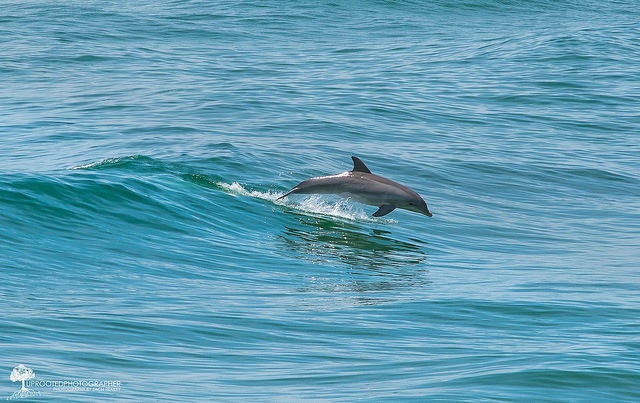Feds underestimated risks of Atlantic offshore oil and gas exploration, new data shows

An alliance of environmental groups is calling on federal regulators to conduct a new analysis of seismic testing for Atlantic oil and gas reserves in light of new data that shows it underestimated risks to marine mammals, like this dolphin photographed off the North Carolina coast. (Photo by Zach Frailey via Flickr.)
Environmental groups are calling on the federal government to halt seismic testing for Atlantic oil and gas reserves given new data that suggests it's underestimating the risks to dolphins and other marine life.
An alliance of 17 groups sent a letter this week to the Bureau of Ocean Energy Management, alerting it to new information that calls into question the conclusions of the agency's 2014 environmental analysis of the practice, which involves blasting high-powered airguns into the ocean waters every 10 seconds for weeks on end. That analysis, known formally as the Programmatic Environmental Impact Statement or PEIS, concluded that seismic testing would have a negligible impact.
But earlier this year, the federal government's own Cetacean and Sound Mapping Working Group, or CetMap, produced new density models for whales, dolphins, and porpoises, mammal species known collectively as "cetaceans." The CetMap models show that most of these species are present in far greater concentrations than BOEM had anticipated within the offshore exploration area, which extends from Central Florida north to the Delaware/New Jersey border.
The environmental groups' letter notes that the numbers of animals that could be harmed by the seismic tests "have been grossly underestimated, potentially by as much as three-fold for some species due to underestimates of marine mammal density and by as much as fifteen-fold (or more) due to reliance on an outdated and inaccurate impact threshold."
The letter also notes that the standard BOEM used to assess impacts is now considered to be outdated and contravenes the best available science, according to a paper published last month in the journal Frontiers in Ecology and the Environment. The lead author on that paper is Douglas Nowacek, a marine acoustics scientist at Duke University in North Carolina. He was one of 75 scientists who sent a letter to BOEM after the agency issued its seismic testing PEIS last year asking it to reconsider due to the potential for enormous harm to marine life.
The environmental groups are now urging BOEM to halt permitting for airgun surveys in the Atlantic until it completes a supplemental impact analysis. Concerns have been raised about the area targeted for seismic testing, which is unprecedented in its vastness, as Coastal Review Online reported recently. Five applications have been submitted for Atlantic survey permits so far.
"It is essential that the agency's assessment of impacts, alternatives, and mitigation measures take place at a scale that more accurately reflects the environmental effect of the activity," the environmental groups' letter to BOEM concludes.
The groups signing the letter are Cape Fear River Watch, Center for Biological Diversity, Clean Ocean Action, Earthjustice, Environment North Carolina, Environmental Defense Fund, Natural Resources Defense Council, N.C. Coastal Federation, N.C Conservation Network, N.C. League of Conservation Voters, Ocean Conservation Research, Oceana, S.C. Coastal Conservation League, S.C. Wildlife Federation, Sound Rivers, Southern Environmental Law Center and the Wildlife Conservation Society.
Tags
Sue Sturgis
Sue is the former editorial director of Facing South and the Institute for Southern Studies.
